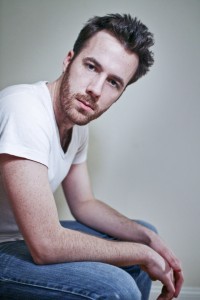interviews
Interview: Miles Klee, Author of Ivyland

Photo by Benjamin Stelly.
Today, OR Books releases its latest, Ivyland, by debut author Miles Klee. The world, which is focused on a fictional New Jersey suburb called Ivyland, is a lot like our own — except caterpillars run wild, policeman are shot down in ice cream trucks without consequence, and a pharmaceutical behemoth peddles a drink called Adderade (it is what it sounds like). The characters, which get their own chapters told from their own points of view, are disparate, ranging from an aging female bus driver, to a man with brain damage, to a callous young man floating in space.
Because the book is told from so many points of view and not linearly, it’s a bit difficult to get a handle on at first. But the crackling prose, dark humor, and well-chosen details draw the reader in, and, once one has gotten used to the back and forth, the book becomes addictive, showcasing the intricate mind of a young author who’s depraved in all the right ways.
Klee brought the manuscript to OR himself, which makes sense if you look at OR’s business model. The publisher is a small one, coming out with only a title or two per month. The texts, which are often political in nature, are printed on demand as well as sold as e-books — and they’re only available directly from OR itself. This progressive look at publishing fits in perfectly with Klee’s unique vision.
Julia Jackson: What qualities do you think make Ivyland and OR Books a good union?
Miles Klee: OR is a delightful operation — it’s like this sleek little shark. It’s exactly what’s necessary to publishing and no more. So in contrast to the big houses it can gamble on experimental debut fiction, which to many editors is hazardous if not entirely anathema.
JJ: What is it about “dystopian novels” that appeals to you? Did you have any specific books in mind as a point of reference? How did you want to make Ivyland different?
MK: The dystopian novel is where sci-fi meets satire. It takes the attitude that you can both imagine a future and demolish that very projection as a ridiculous exercise. And there’s the matter of humans having only ever lived in unjust conditions … dystopia resonates because what else have we known? At the risk of exposing my imitations, some lights I steered by include the stories of George Saunders, Fiskadoro and Jesus’ Son by Denis Johnson, plus the lingering trauma of A Clockwork Orange and J.G. Ballard’s Atrocity Exhibition. You can probably guess from the Huxley epigraph that I skew more Brave New World than 1984. The difference may be that I’m less interested in the sweeping concepts than their manifestation at a surface level. I wanted only narrow, pulsing glances at a big unfocused picture, this shadowy state of affairs that nobody can quite get a handle on. Narrative omniscience, a close cousin to know-it-all-ism, was not to be tolerated.
JJ: When did it become apparent to you that this story needed to be told unconventionally, in terms of chronology and the number of points of view?
MK: I had a hell of a time sticking to the main storyline as I then understood it. The more I wrote the more tangential and digressive it became. It occurred to me that, while I didn’t want to write about anything so odious as the Internet, the novel’s form could follow a digital-age logic: we have eight tabs open on our internet browser at any moment, we backpedal and recall and click around indiscriminately, we over complicate our attempts to see the world. Why suffer for the artifice of linearity?
JJ: Why caterpillars/moths, crumbling bridges, and space exploration? Do you see any relation between the three?
MK: They’re three of my greatest fears. But in fiction they can be used to broadly evoke a vengeful planet, national decay and mindless symbolism, not to mention our collective denial over such irritating realities.
JJ: The book displays an impressive range of voice. Were there any characters that were exceptionally difficult to write from? Which one do you personally relate to the most? The least?
MK: To venture outside one’s own demographic seems clearly dangerous — if I write about a white, melancholy, middle-class guy, the worst you might say is we’ve read plenty of that already. But I’d hate to only write what I know. Hecuba, who’d been around longer than anyone, was a challenge: how can we access the opposite gender? Grady, being cognitively scrambled, needed his own imperfect but consistent vernacular, and that too was a thorny problem. In a way, though I shudder to say it, Cal was easiest … one simply had to write what was too awful to say aloud.
JJ: In one of my favorite chapters, Cal observes, “Take the worst thing you’ve done, and the best. These are two people with nothing in common,” which strikes me as quite true and one of the more maddening and fascinating things about humanity. Yet Ivyland seems to be a book that focuses largely on the things people do that are selfish, violent and primal. What is it about these base instincts that interests you or feels essential?
MK: Given enough intelligence, there’s a total horror about the id: that it is what finally controls us, what eventually wins out. Moreoever, we exaggerate our own decency and rationalize our cruelty. So much about recognized ‘evil’ — listen to any murder case in court — is an attempt to dodge its influence or explain it away like some Victorian phantasm. I can’t get excited about characters staking out moral high ground, but there’s something perversely fun about watching them try to claw their way up there by unmooring, distancing, excusing themselves from agency in their savage moments. The talent for contradiction — the artful suspension of an interior lie — is, I think, unique. And therefore essential, disturbing, etc.
JJ: Have you read anything amazing lately?
MK: Édouard Levé’s Suicide was mesmerizing. And I’ll never get enough of Kay Ryan’s poetry. I wish I could write anything so spring-coiled.
JJ: Have you thought about what you’ll work on next?
MK: I’m rounding off a collection of short stories, many already published somewhere or other on the web, and revising a novella that may fit in there as well. Beyond that, I’ve just this week begun sketching notes for something longer, a bit more recognizably a novel, one that burns at a cooler temperature … it’s a terribly fucked-up idea, however, maybe too fucked-up to be funny … though of course I don’t believe that.

Ivyland by Miles Klee
***
— Miles Klee is the author of Ivyland (OR Books, 2012). He lives in Manhattan with his wife and two dogs.
— Julia Jackson is a fiction writer and the editor of Electric Dish. Find her on the internet here.









